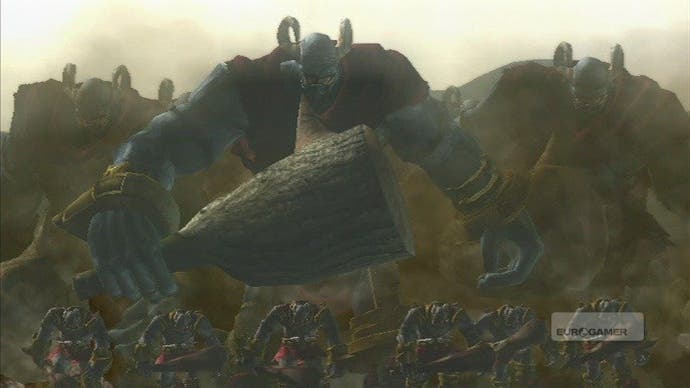Zangeki no Reginleiv
Norse nonsense.
Dead baddies scatter gems onto the landscape when they die, which you collect to make your weapons from. You get different gems for lopping different limbs from ogres, or for taking the wings of infuriating flying dragon-things to bring them aground, but it's not at all a complicated system. Nothing about Zangeki no Regenliev is complicated. The weapons tree may look daunting as it expands and expands, but really you're just choosing between a bow that kills five enemies at once pretty dead or one enemy really dead, or a hammer that swings marginally less slowly than the next one, or wands that shoot different-coloured glass globules.
The battles take place in huge and pathetically poor-looking levels. Late N64-era pop-up is everywhere. Ogres can destroy everything, from huts to trees to buildings and mountainsides. Unfortunately, Frey and Freya move around these levels amazingly slowly, leaving you skating stupidly around with the forward dodge (if you can pull it off with the infuriating nunchuck controls) in search of the next group of ogres. You're constantly accompanied by small armies of NPCs, babbling repetitive and hugely irritating battle cries and commentary.
All they ever really say is, "Oh noes! More ogres!", which is exactly what you'll be saying after 15 levels. Zangeki is amazingly repetitive. You kill ogres, and you can do so for 40 hours if the will possesses you, with both characters, over 5 difficulty levels. There's a full online mode, too, playable in four-player co-op, but anything you've unlocked in the single-player doesn't count, so you have to start again from the very beginning. You certainly can't fault the game for a lack of content.
There's not much to break up the senseless slaughter, but Zangeki's occasional attempts at set-piecing are extremely funny. Huge bosses and your NPC army will wait patiently at a gate for you to catch up, looking at each other awkwardly, before proceeding with the scripted gate-rush. Ogres on rhinos will stand stock-still until you walk within the right range of them, and then proceed to gallop in circles, stopping stock still again when you walk away from them.
The cut-scenes are awful, too. Trying to tell a story with animated cut-scenes and characters and everything when you apparently have £145 in your development budget it a terrible idea. Earth Defence Force gave us ants and told us to shoot at the ants, because the ants were bad. That's really all we needed. Zangeki's attempt at Norse mythology needlessly overcomplicates things.

Glinting through all this awfulness are moments of greatness: when limbless ogres get caught on the scenery and jerk pathetically about, gurning gormlessly; or when a hammer strike makes four of five of the big bastards explode into meaty chunks at once, and you can barely see through the hilariously terrible blood effects; or when you're fed up of slicing up orcs and suddenly an elephant with four tusks and an axe tied to its trunk appears out of nowhere, or spaceships arise from the sea and start beaming down yet more ogres (the story explains nothing about why any of this might be happening). It's shonky as all hell, but Zangeki is rarely boring.
It's a Sandlot game through and through, built with a charming mixture of incompetence and a fantastic understanding of the ludicrous. But where Earth Defence Force 2017 is enjoyable because it's a bit rubbish, Zangeki no Reginliev is enjoyable despite it, and only inconsistently. There's another crucial difference, too. EDF cost £20 and you could buy it in a shop, while Zangeki costs £45 plus shipping and customs charges, and you have to buy it from the internet.
It's impossible to recommend actually spending money on it unless you're very rich and have a very strong affection for terrible videogames. If that's you, you'll definitely enjoy yourself.
Zangeki no Reginleiv is only available in Japan and we're aware of no plans for a Western release. Keza didn't say if you need an understanding of the Japanese language to play it, but based on the above, we'd assume not.
